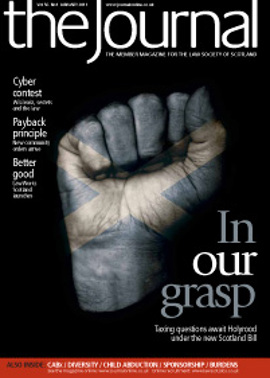Cut the risk of harm

Interim awards ad factum praestandum
In Whyte & Mackay Ltd v Capstone International Inc [2010] CSIH 87 Lord Hardie, in giving the opinion of the Inner House, made observations as to the principles which apply in considering whether orders ad factum praestandum should be made ad interim. The defenders sought an order ordaining the pursuers to continue to perform a contract, enabling them to continue to distribute the pursuers’ product in the USA.
In particular, Lord Hardie observed that the court should consider whether the balance of convenience was such as to justify the making of such an interim order, bearing mind the nature and degree of harm likely to be suffered on either side by the grant or refusal of the interim order and the relative strengths of the parties’ positions. In the early stages of litigation when the facts had not been established, one consideration should be to minimise the risks of harm to either party in the event that the granting of the interim award was ultimately proved to be ill founded.
Onus of proof
In Pelagic Freezing (Scotland) Ltd v Lovie Construction Ltd [2010] CSOH 145, the pursuers sought damages in respect of damage arising from water ingress through a roof. The defenders pled that the claim had prescribed and relied on ss 6(4) and 11(3) of the Prescription and Limitation (Scotland) Act 1973. A preliminary proof was assigned on this issue and the matter Lord Menzies required to address was upon which party the onus of proof initially lay. The parties had agreed that in relation to matters which might delay the running of prescription in terms of s 11(3) or 6(4) of the 1973 Act, the onus lay on the pursuers. However, there was a dispute as to where the onus initially rested in terms of s 11(1).
On reviewing authorities, Lord Menzies noted that in Dunlop v McGowans 1979 SC 22 (also 1980 SC (HL) 73), the Lord Justice Clerk, Lord Wheatley, observed at 34 that the extinction of an obligation by the operation of prescription meant that there was no legal right in existence and thus it was a matter of which a court could take account ex proprio motu. The pursuers were in effect asserting that they had an existing legal right against the defenders and thus in doing so were making an affirmative proposition that they had such a right. In those circumstances, it was logical that the onus initially rested with the pursuers.
Contempt of court
As a follow-up to the recent reference to NJDB v JEG (see November article), Sheriff Robertson required to consider a matter in the course of the proof and issued an opinion on 22 January 2009 in Stirling Sheriff Court. In the course of the defender being cross examined, she was asked about her failure to allow contact in contravention of a court award. Her counsel argued that she was entitled to be warned against incriminating herself and in particular she did not require to answer any question which might risk a finding that she had been in contempt of court.
Sheriff Robertson declined to administer such a warning for a number of reasons. First, the action was one for contact, not a minute seeking a finding of contempt. The two were distinct processes with the onus of proof being higher in the latter. It was clear from the pleadings that the father and the child’s curator considered that the mother had been acting in contravention of the award. Further, the mother had given evidence in chief regarding these matters and to allow her to refuse to answer questions put in cross examination on such issues would leave the sheriff in a very difficult position in attempting to assess the party’s evidence on such matters when it had not potentially been subject to cross examination.
Sheriff Robertson also made the observation that when applications were made to find a party in contempt in such actions as a result of failure to obtemper the likes of contact awards, such required to be dealt with summarily. It was, in his opinion, inappropriate to hold these matters in abeyance as a means of compelling the adherence to an interlocutor awarding contact. Contempt proceedings should not be engaged lightly. If instituted, then they should be the subject of separate and immediate inquiry.
The sheriff further observed that the fact that prior minute proceedings for contempt had been dismissed of consent did not mean there was an acceptance that the party had not in fact been in contempt.
Expenses
In Benjamin v The Standard Life Employees Services Ltd, Edinburgh Sheriff Court, 17 December 2010, the issue before Sheriff Principal Bowen was the allowance of the costs of reports from experts employed by a party in a litigation in which defences had been lodged. The action, however, was resolved prior to a proof being allowed. Provided the work carried out by the expert was relevant and necessary for the proof of matters on record, the costs were recoverable.
Sequestration
In Accountant in Bankruptcy v Grant, Edinburgh Sheriff Court, 27 October 2010, a summary application had been presented seeking various orders as a consequence of the discharge of a trustee and the bankrupt and then the bankrupt becoming entitled to assets as a result of a claim against a third party. Sheriff Holligan, on reviewing authorities, first concluded that the discharges did not bring the sequestration to an end. In terms of the Bankruptcy (Scotland) Act 1985 such an asset was property in the sequestration and any discharge did not alter that fact. An application in terms of s 29(6) of the Act however was not competent. The circumstances did not fall within the ambit of the provision.
Turning to the operation of s 63 of the 1985 Act, Sheriff Holligan did not consider that the provisions of s 63(1)(a) were sufficiently wide. However, he considered that the application was “connected with” the sequestration process, and thus it fell within the ambit of s 63(1)(b).
Update
Since the last article Hepburn v Royal Alexandra Hospital NHS Trust (September article has been reported at 2010 SLT 1071, Steel v Steel (September) at 2010 SLT 1085, Ewing v Times Newspapers Ltd (September) at 2010 SLT 1093, The Scottish Ministers v Smith (July) at 2010 SLT 1100, 2010 SCLR 669, Chief Constable Northern Constabulary v A (July) at 2010 SLT (Sh Ct) 203, and Matthew, Petr (July) under the name H’s Curator Bonis, Applicant at 2010 SLT (Sh Ct) 230.
In this issue
- Prison accommodation for transgender people
- Challenge of the new
- An issue that will not die
- Revolution in the making
- Sasine service
- The welfare imperative
- War on the web
- Payback time
- Diverse means
- Good and better
- Help where it's needed
- Appreciation: Elaine Tyre
- Forum discusses EU contract law
- Law reform update
- Time to take the plunge?
- Ask Ash
- Money talking
- Cut the risk of harm
- Trust rewritten
- Promoting responsibility
- Fathers made relevant
- Tread warily: habitats
- Forum at the frontiers
- Website review
- Book reviews
- Signs of the times






